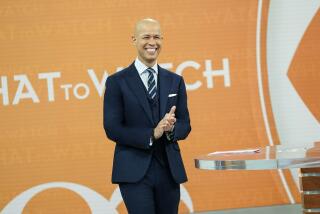Medical correspondents face delicate balance in Haiti
- Share via
Reporting from New York — Some of the most dramatic television images beamed from Haiti’s quake-ravaged communities have shown harried doctors frantically tending the wounded with rudimentary tools.
“To say it’s primitive is an understatement,” CBS News medical correspondent Dr. Jennifer Ashton said Saturday on “The Early Show.” “This is analogous to Civil War medicine.”
Ashton would know. As she spoke, the network aired footage of her in scrubs and a face mask, assisting in the nighttime surgery of a 15-year-old girl in shock from a hasty amputation.
Confronted with the overwhelming need in Haiti, medical doctors who serve as network correspondents have been toggling between roles: that of physician and reporter. On Sunday, ABC’s Dr. Richard Besser assisted a pregnant woman in labor and NBC’s Dr. Nancy Snyderman operated on the wounded in a makeshift clinic. CNN’s Dr. Sanjay Gupta performed surgery Monday on a girl with a skull fracture who had been airlifted to the aircraft carrier Carl Vinson.
“When I see a situation where there’s something I could do to help somebody, I’m going to do that,” Besser said. “It would be cruel and heartless to do anything but.”
But some media ethicists said medical correspondents should consider forgoing their journalistic roles if they’re going to participate in the relief effort. While reporters should help when they can save a life or prevent profound harm, “I think it’s very hard for an individual who is professionally and emotionally engaged in saving lives to be able to simultaneously step back from the medical work and practice independent journalistic truth-telling,” said Bob Steele, journalism values scholar at the Poynter Institute and journalism professor at DePauw University.
‘Delicate balance’
And by focusing on the work being done by their own staff, “news organizations at some point appear to be capitalizing for promotional reasons on the intervention by journalists,” Steele added.
Snyderman, a head and neck cancer surgeon who arrived in Haiti on Saturday, said she is acutely aware of the conflict.
“Morally, I have a responsibility to help people,” she said. “From a journalistic standpoint, I have a responsibility to tell stories. And in between is a very delicate balance that I wrestle with.”
Snyderman -- who has been so moved by the need in Haiti that she plans to devote several weeks a year to relief work -- spent much of the weekend without her camera crew, triaging patients and setting broken bones with cardboard and gauze. She said she’s agonizing over how best to use her time.
“I have to constantly think, how can I make a difference?” she said. “Do I make a difference by seeing 10 more patients? Or by telling people what I’m seeing? I don’t know that I have an answer, other than I’m going to try to do two jobs while I’m here.”
Paul Friedman, executive vice president for CBS News, said he normally would agree that a reporter should not wear two hats on a story, “but in this case I can’t conceive of a conflict we couldn’t figure out and remedy,” adding that he thinks the audience benefits from the first-person storytelling.
Gupta, a neurosurgeon, became a central player in a story this weekend when, amid security concerns, a Belgian medical team evacuated a field hospital he was visiting. Saying he feared some of the patients left behind would die, CNN’s chief medical correspondent stayed the night as the lone doctor, stabilizing the critically ill with the help of his crew.
The network devoted substantial air time to the story, including on Gupta’s own show Sunday.
“I don’t think our intention is to ever make the story about myself,” Gupta said. “I think people innately understand that there is a tremendous medical need down here, and if you can help, you should help.”
CNN/U.S. President Jon Klein said the network is telling a compelling part of the story in Haiti by showcasing Gupta’s medical work there.
“His mission is to explain the urgency of the medical situation to the world,” Klein said. “In addition to the hands-on care he’s providing, Sanjay is providing a unique service most doctors couldn’t.”
This isn’t the first time medical correspondents have played doctor in the field. Gupta himself performed brain surgery five times in 2003 while embedded with the U.S. Navy’s “Devil Docs” medical unit in Iraq. But news executives said the number of network correspondents assisting the wounded in Haiti was unprecedented.
Seeing a need
That’s in part because several practicing doctors were hired this year by the networks, including Ashton, an OB/GYN, and Besser, a pediatrician and former acting director of the Centers for Disease Control and Prevention. In Haiti, they have encountered both dire need and a dearth of medical personnel.
Besser said he believes he can do the most good by reporting on the public health conditions, not working as a doctor. Still, when he found a young woman having a difficult labor in a park Sunday, he felt compelled to help. After consulting on her condition via BlackBerry with obstetricians back in the United States, he helped transport her to a field hospital, where her baby was safely delivered.
“What I’ve tried to do is use those medical encounters to illustrate a larger health problem,” said the ABC correspondent, who noted the high infant mortality rate in Haiti in his “Good Morning America” piece about the incident.
“I may blur the rules of dispassionate journalism,” he added, “but I think it would be impossible to be a true physician working as a journalist and not help when you can contribute.”
More to Read
Sign up for Essential California
The most important California stories and recommendations in your inbox every morning.
You may occasionally receive promotional content from the Los Angeles Times.










